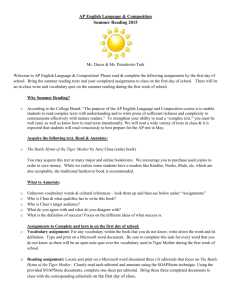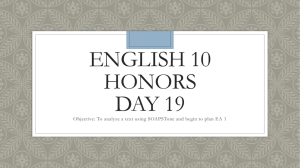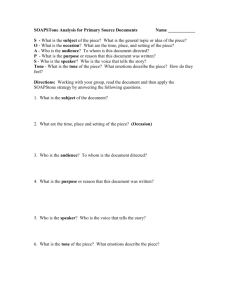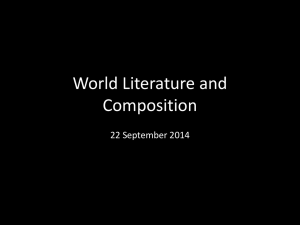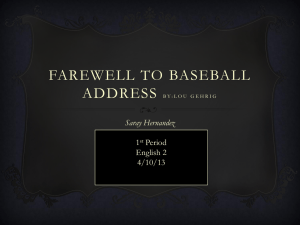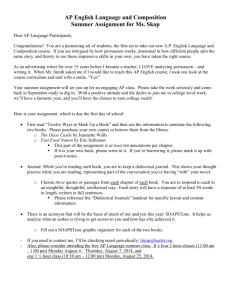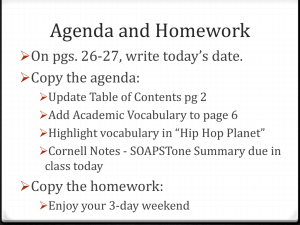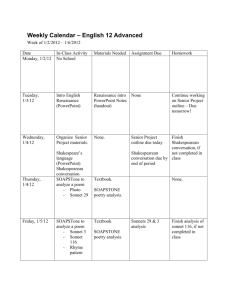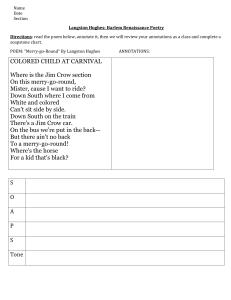10th - 12th grade Summer Reading List
advertisement
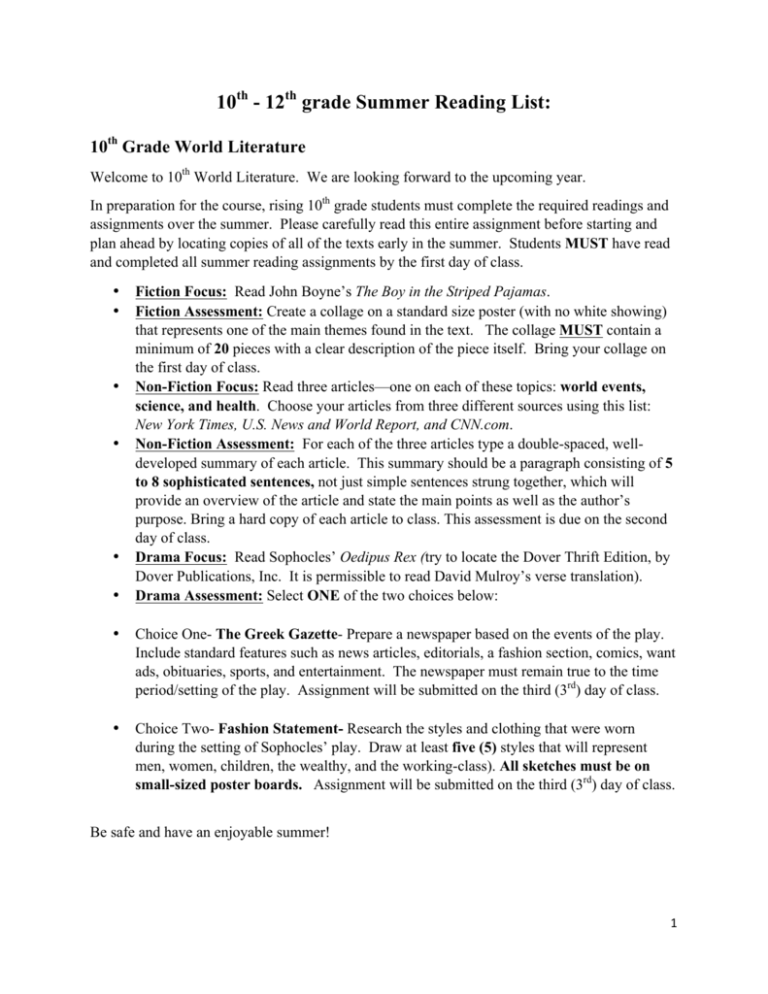
10th - 12th grade Summer Reading List: 10th Grade World Literature Welcome to 10th World Literature. We are looking forward to the upcoming year. In preparation for the course, rising 10th grade students must complete the required readings and assignments over the summer. Please carefully read this entire assignment before starting and plan ahead by locating copies of all of the texts early in the summer. Students MUST have read and completed all summer reading assignments by the first day of class. • • • • • • Fiction Focus: Read John Boyne’s The Boy in the Striped Pajamas. Fiction Assessment: Create a collage on a standard size poster (with no white showing) that represents one of the main themes found in the text. The collage MUST contain a minimum of 20 pieces with a clear description of the piece itself. Bring your collage on the first day of class. Non-Fiction Focus: Read three articles—one on each of these topics: world events, science, and health. Choose your articles from three different sources using this list: New York Times, U.S. News and World Report, and CNN.com. Non-Fiction Assessment: For each of the three articles type a double-spaced, welldeveloped summary of each article. This summary should be a paragraph consisting of 5 to 8 sophisticated sentences, not just simple sentences strung together, which will provide an overview of the article and state the main points as well as the author’s purpose. Bring a hard copy of each article to class. This assessment is due on the second day of class. Drama Focus: Read Sophocles’ Oedipus Rex (try to locate the Dover Thrift Edition, by Dover Publications, Inc. It is permissible to read David Mulroy’s verse translation). Drama Assessment: Select ONE of the two choices below: • Choice One- The Greek Gazette- Prepare a newspaper based on the events of the play. Include standard features such as news articles, editorials, a fashion section, comics, want ads, obituaries, sports, and entertainment. The newspaper must remain true to the time period/setting of the play. Assignment will be submitted on the third (3rd) day of class. • Choice Two- Fashion Statement- Research the styles and clothing that were worn during the setting of Sophocles’ play. Draw at least five (5) styles that will represent men, women, children, the wealthy, and the working-class). All sketches must be on small-sized poster boards. Assignment will be submitted on the third (3rd) day of class. Be safe and have an enjoyable summer! 1 10th Honors Grade World Literature Welcome to 10th World Literature. We are looking forward to the upcoming year. In preparation for the course, rising 10th grade students must complete the required readings and assignments over the summer. Please carefully read this entire assignment before starting and plan ahead by locating copies of all of the texts early in the summer. Students MUST have read and completed all summer reading assignments by the first day of class. • • • • • • Fiction Focus: Read John Boyne’s The Boy in the Striped Pajamas. Fiction Assessment: Create a collage on a standard size poster (with no white showing) that represents one of the main themes found in the text. The collage MUST contain a minimum of 20 pieces with a clear description of the piece itself. Bring your collage on the first day of class. Non-Fiction Focus: Read five articles—one on each of these topics: world events, science, and health, editorial, and film/book review. Choose your articles from five different sources using this list: New York Times, U.S. News and World Report, CNN.com, Huffington Post, Washington Post, The Atlantic, National Public Radio, and The New Yorker. Non-Fiction Assessment: For each of the three articles type a double-spaced, welldeveloped summary of each article. This summary should be a paragraph consisting of 5 to 8 sophisticated sentences, not just simple sentences strung together, which will provide an overview of the article and state the main points as well as the author’s purpose. Bring a hard copy of each article to class. This assessment is due on the second day of class. Drama Focus: Read Sophocles’ Oedipus Rex (try to locate the Dover Thrift Edition, by Dover Publications, Inc. It is permissible to read David Mulroy’s verse translation). Drama Assessment: Select ONE of the two choices below: • Choice One- The Greek Gazette- Prepare a newspaper based on the events of the play. Include standard features such as news articles, editorials, a fashion section, comics, want ads, obituaries, sports, and entertainment. The newspaper must remain true to the time period/setting of the play. Assignment will be submitted on the third (3rd) day of class. • Choice Two- Fashion Statement- Research the styles and clothing that were worn during the setting of Sophocles’ play. Draw at least five (5) styles that will represent men, women, children, the wealthy, and the working-class). All sketches must be on small-sized poster boards. Assignment will be submitted on the third (3rd) day of class. Be safe and have an enjoyable summer! 2 11th grade American Literature and Composition (CP and Honors) Required: Read and Annotate* - A Formal Assessment on both texts during the first three weeks of school 1. The Grapes of Wrath by, John Steinbeck • Complete Quote Analysis 2. Nickel and Dimed by Barbara Ehrenreich • Complete SOAPSTone 11th Grade AP Language & Composition 1. Required Read and Annotate*: Formal Assessment on content of this book during week one of school. a. Capote, Truman. In Cold Blood 2. Required 2nd Read and Annotate*. Select one. (Must be a book you have not already read.) Complete Quote Analysis Assignment a. b. c. d. e. f. g. h. i. j. k. l. Foer, Franklin. How Soccer Explains the World. Junger, Sebastian. The Perfect Storm: A True Story of Men against the Sea King, Stephen. On Writing Woolfe, Virginia. A Room of Own’s One Gilbert, Daniel. Stumbling on Happiness Roach, Mary. Stiff Lamottt, Anne. Bird by Bird Terkel, Studs. Working Heller, Joseph. Catch 22 Morrison, Toni. Beloved Sinclair, Upton. The Jungle Plath, Sylvia. The Bell Jar 3. Required Essays to Read, Annotate*, and Complete SOAPSTone Analysis. The following essays are free on the internet. Web addresses follow titles. If you find that the link is no longer working, you can Google the title and find the essay in another location. These essays can also be found in a great anthology entitled 40 Model Essays: A Portable Anthology by Jane E. Aaron. I highly recommend that you purchase it if it is at all possible. The ISBN # is: 13: 978-0-312-43829-6. This book can be purchased used online. (This assignment will be due the 2nd week back at school) (Description) Once More to the Lake - E.B. White http://www.moonstar.com/~acpjr/Blackboard/Common/Essays/OnceLake.html 3 (Narrative) Shooting an Elephant - George Orwell http://www.online-literature.com/orwell/887/ (Example) Black Men and Public Space - Brent Staples http://studentoffortune.com/question/594456/English-Composition/1013592-Essay%20%20Black%20men%20in%20public%20spaces.pdf (Classification) The Plot Against People- Russell Baker http://www.mpsaz.org/rmhs/staff/djnebel/de101/what/files/baker.pdf (Process Analysis) Dumpster Diving - Lars Eigner http://producer.csi.edu/cdraney/archive-courses/fall07/engl102/e-texts/eighner-dumpster.htm (Comparison and Contrast) Neat People vs. Sloppy People -Suzanne Britt http://officeinstructor.com/EssayWriting/EssayPDFs/Neat%20vs%20Sloppy.pdf (Definition) I Want A Wife -Judy Brady http://www.columbia.edu/~sss31/rainbow/wife.html (Cause and Effect Analysis) Cultural Baggage- Barbara Ehrenreich http://www.nytimes.com/1992/04/05/magazine/hers-cultural-baggage.html (Argument and Persuasion) A Modest Proposal -Jonathan Swift http://emotionalliteracyeducation.com/classic_books_online/mdprp10.htm *An annotation is a note that is made while reading any form of text. This can be as simple as underlined or highlighted passages. Often, the reader will make notes about setting, characters, conflict, theme, tone, and the like. In the case of these essays, you should make notations with regard to the method the author uses to make his or her point. (Definition, description, comparison/contrast, etc.) 4 11th grade IB English A: Literature HL Year 1: 1. Native Son by Richard Wright* o Annotate and be prepared to write an in-class, timed SOAPSTone response for this novel upon your return to school in August. (See Annotation and SOAPSTone directions below.) 2. The Scarlet Letter by Nathaniel Hawthorne o Annotate and be prepared for a quiz (which will cover more than what you may find in online summaries…) during the first week of school. *Herman Melville’s Moby Dick is the alternative option if you do not wish to read Native Son. While this novel is a prominent work in American Romanticism, it is not in our IB curriculum. For this reason, students who do not read Native Son may be at a disadvantage in terms of class participation and the IB exam (**see note below). Students who choose to read Moby Dick will do the in-class SOAPSTone assessment for this novel. **If I choose to read the alternative novel instead of Native Son, how will it affect me? We will study Native Son during the first month of school, during which time students will write an essay and create a visual presentation of a motif in the novel. Those who read Moby Dick can do this assignment for that novel instead, so their grade will not be affected. However, a lack of familiarity with Native Son will make it a challenge to fully participate in the class discussions, close reading exercises, and activities we have historically done with this novel. Again, this will not affect the student’s grade, but class discussions over Native Son have been HUGELY impactful over the years, and presentations and essays have consequently been insightful, thought-provoking, and introspective. The IB exam in the fall is the Individual Oral Presentation (IOP). For this exam, students study three different works in class and then choose one to present to the class in the form of a 15 minute oral presentation which analyzes a literary component of the work. Students who do not read Native Son will only be able to choose from the remaining two works in this unit (As I Lay Dying and The Awakening). They cannot use Moby Dick because we are not allowed to offer a fourth option for the IOP. There is no reason why the student cannot give an excellent presentation on one of the other two works in the unit, so choosing the alternative novel does not have to negatively impact the student’s IB assessment score—it just decreases the number of presentation options. While fewer options is certainly a disadvantage, I will state frankly that I believe the greater disadvantage lies in missing out on the paradigm-shifting, character-building discussions Native Son evokes. 5 12th grade British Literature and Composition (CP and Honors) Required: Grendel by John Gardner • Annotate and be prepared to write an in-class, timed SOAPSTone response for this book upon your return to school in August. (See SOAPSTone directions below.) Choose one: The Handmaid’s Tale by Margaret Atwood On the Beach by Nevil Shute Wide Sargasso Sea by Jean Rhys The Reluctant Fundamentalist by Mohsin Hamid The Hound of the Baskervilles by Sir Arthur Conan Doyle Juliet, Naked by Nick Hornby • Annotate and complete the quote analysis. (See directions below). 12th grade AP Literature and Composition 1. Invisible Man by Ralph Ellison o Annotate and be prepared to write an in-class, timed SOAPSTone response for this novel upon your return to school in August. (See SOAPSTone directions below.) 2. How to Read Literature Like a Professor by Thomas C. Foster o Annotate and expect a short-answer reading quiz upon your return to school. 12th grade IB English A: Literature HL Year 2: 1. Persepolis (complete edition) by Marjane Satrapi o Annotate and be prepared to write an in-class, timed SOAPSTone response for this graphic novel upon your return to school in August. (See SOAPSTone directions below.) 2. Thousand Cranes by Yasunari Kawabata o Annotate and be prepared to write an in-class, timed SOAPSTone essay for this novel upon your return to school in August. (See SOAPSTone directions below.) 3. A Hero of our Time by Mikhail Lermontov o Annotate and be prepared to write an in-class, timed SOAPSTone essay for this novel upon your return to school in August. (See SOAPSTone directions below.) *You will only write ONE SOAPStone response, but you will not know which book you are assigned until the day of the timed, in-class writing. This is why you must thoroughly read and annotate all three. 6 Annotation Guide: Margin notes and color marking Mandatory: Margin notes in which you do the following (this list is not exhaustive): • Write your personal response to the text. • Note implications of the text. • Note author’s purpose as well as his/her technique. • Explain the significance of the text. • Define unknown vocabulary. Optional, but recommended: Color Marking Color 1: THEME Mark anything which supports the main idea/s of the story. Include margin notes to explain your marking. Color 2: SETTING Mark every significant description of the setting with the understanding that there may be more than one prominent setting in each story. Include margin notes to explain your marking. Color 3: CHARACTERIZATION Mark anything which helps readers gain a greater understanding of the character (actions, dialogue, description, etc.) Include margin notes to explain your marking. Color 4: LITERARY DEVICES/SIGNIFICANT PASSAGES Mark literary devices and explain the effect of each. Literary devices include (but are not limited to): metaphor, simile, personification, repetition, allusion, irony, foreshadowing. Also, highlight any significant passages which stand out to you as a reader. Include margin notes to explain your marking. Color 5: AUTHOR Mark any passage which illustrates the author’s perspective. Include margin notes to explain your marking. SOAPSTone written assessment: 1. Annotate! (Do this over the summer and follow the guide above.) 2. Timed, in-class assessment based on the SOAPSTone model (You will do this in class during the first week of school. In order to prepare yourself, see the directions for this written response below.) SOAPSTone written response for required reading: (to be completed in class in August) A SOAPSTone is one of the best ways that you can begin to look at analysis differently, essentially analyzing the author’s purpose and effectiveness of diction, syntax… and so much more. Here are the areas for analysis for the summer readings assigned to this format: Speaker: The voice that tells the story. What is it that you know about the writer or speaker that may impact an argument the speaker makes? A speaker’s ethnic background or place of origin, class, gender, nationality, sexual orientation, religious affiliations, or membership in any identity group may lead you to make inferences about the speaker’s argument. Please understand, too, more localized or specific identity groups like jazz musician, football player, high school student, reporter, soldier, or mother are just as important, if not more, as the larger identity groups like that of being female or American. 7 Occasion: the time and place of the piece. What prompted this to be written? All writers are influenced by the larger occasion: an environment of ideas, attitudes, and emotions that swirl around a broad issue. Then there is the immediate occasion: an event or situation that catches the writer’s attention and triggers a response. Audience: The group of readers to whom this piece is directed. Audience is a significant element in understanding an argument. Writers and speakers tailor their arguments to the interests of their perceived audience. The evidence or support that a writer employs to make an argument might change based on the audience. Purpose: the reason behind the text. Knowing the writer’s purpose is also important. How does the writer want the audience to react? Does this writer call for some specific action or is the purpose of writing to convince the reader to think, feel, or believe in a certain way? Subject: the clear idea of the writing. The subject of an effective argument should be clear to the reader. The reader should be able to describe the subject with a few words or phrases. A clear subject ensures that the writing be focused and does not drift into commentary that detracts from the writer’s purpose. TONE: the author’s attitude. The degree to which an argument is effective may ultimately hinge upon the writer’s attitude toward the subject or audience. Here again is an area where audience is significant. Writers adopt different tones to further the same argument as the audience changes. The presence of anger, sarcasm, or guilt can affect an overall argument significantly. Quote Analysis for 10 selected quotes: Directions: Choose 10 quotes or passages from your book. Type them out and give a thorough analysis of each. Include the following information: 1. Paraphrase the message of the passage. 2. Explain the significance of the passage in relation to the story as a whole. 3. What literary elements are in this passage and how are they used effectively? 8
